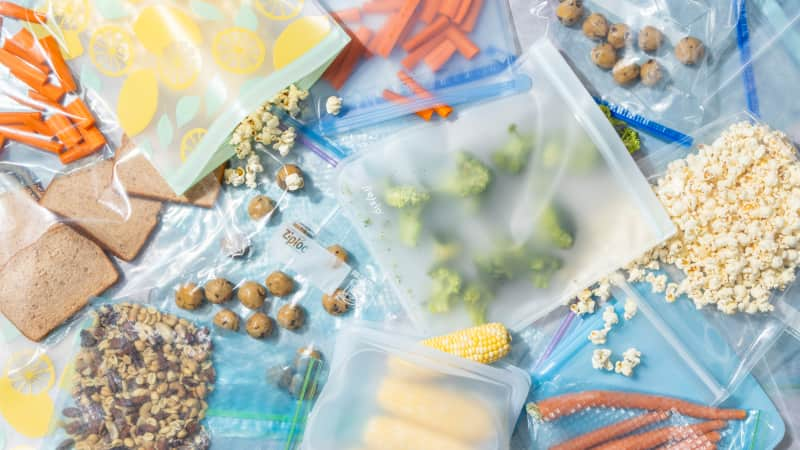Bag Drying Racks
Equipment Review
We want a strong, leakproof bag—reusable or not—that closes securely without a fuss and keeps food fresher for longer.
Published Jan. 26, 2024.

We tested top-selling single-use and reusable food storage bags from major brands such as Ziploc, Glad, and Stasher. We focused on “freezer” bags, which are more protective, and opted for the 1-gallon size where possible. In single-use plastic bags, our co-winners impressed us with easy-sealing, secure, leakproof closures; generous capacities; and durable construction. Choose Ziploc Freezer Bags Gallon, which are available in supermarkets, or LK 10" x 12" Gallon Heavy Weight Seal Top Freezer Bags (4 mil), which are designed for food service and available in bulk online. In reusable bags, we recommend (re)zip Gallon Bag 4-Pack and Ello Reusable Gallon Storage Bags, Set of 2. Both are made from flexible, durable polyethylene vinyl acetate (PEVA), seal easily, and closely resemble the shape and functionality of gallon-size single-use plastic bags.
Storing food is easy with a sturdy gallon-size bag, whether it’s single-use plastic or reusable. In the test kitchen, we love gallon-size bags for everything from storing fresh herbs, greens, and vegetables to marinating meats and keeping leftovers. We use them when freezing raw and prepared foods, including cookie and pizza dough, soups and sauces, beans, breads, and meats. We’ve even snipped off the corner of a plastic bag to make a pastry bag.
Both single-use and reusable bags have pluses and minuses. Single-use plastic bags are inexpensive, widely available, and convenient, particularly when you can throw them away after storing messy foods or raw meat. Reusable bags cost more up front, but they can save you money over time. To minimize the environmental impact and potential health issues surrounding single-use plastics, we’ve long recommended reusable bags, though most were previously available only in snack and sandwich sizes. Recently, gallon-size bags have arrived on the market.
We tested a lineup of large single-use and reusable bags, focusing on “freezer” bags whenever possible since they are constructed to be thicker, sturdier, and more protective than “storage” bags. Likewise, we opted for gallon-size bags whenever possible since we like their versatility. We compared the bags’ capacity, ease of use, protection, and durability.

The mission of America’s Test Kitchen Reviews is to find the best equipment and ingredients for the home cook through rigorous, hands-on testing. We stand behind our winners so much that we even put our seal of approval on them.

Lisa is an executive editor for ATK Reviews, cohost of Gear Heads on YouTube, and gadget expert on TV's America's Test Kitchen.

This is a members' feature.